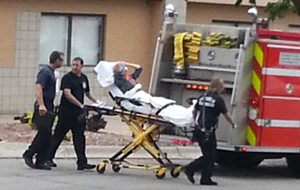[Another abortion mill has closed due to health and safety concerns. We believe that if every abortion mill was regularly inspected, very, very few would be allowed to remain open. It should be a wake up call to women considering abortion that these death centers would continue to operate under conditions “posing immediate and serious risk of harm to patients.” That speaks volumes about their phony concern for women. ~OR Staff]
N.J. failed to inspect abortion clinic
Closed Atlantic City facility was years overdue for a state review
By Michael Clark, Staff Writer
Published: Friday, June 29, 2007
ATLANTIC CITY — The state’s inspection of a city abortion clinic last week was the facility’s first in six years, despite the state health department’s requirement to conduct inspections once every other year.
The Alternatives abortion clinic on Pacific Avenue, which was last inspected in 2001, was shut down a week ago after officials responded to a complaint concerning change-of-ownership issues. Although that complaint was unfounded, inspectors found several violations “posing immediate and serious risk of harm to patients,” according to a letter obtained Thursday by The Press from the state to the clinic’s medical director, Dr. Alan Kline.
Although the complete report has not been released by the health department, the letter lists some of the violations, including the absence of hot water for more than a year, a scrub sink for sterilization, a mechanical ventilator and the anti-hyperthermia drug Dantrium.
Tom Slater, a spokesman for the state Department of Health and Human Services, acknowledged that the agency has been unable to keep up with its inspections because of a shortage of staff and the continued growth of abortion clinics throughout New Jersey. The closest clinic to Alternatives is in Cherry Hill, Camden County.
“We do always respond quickly to any complaints we get,” Slater said in the agency’s defense. “You saw in this case how quickly we responded.”
But Slater later confirmed that the complaint had been filed June 8, two weeks before the agency began its inspection.
“With a limited staff that was fairly quick,” he said.
The department’s staff shortage reflects a national trend of a shrinking public health work force. That trend, coupled with the 70 percent growth in acute-care facilities the agency is required to inspect, hamstrings the state from living up to its standards.
“That’s a poor excuse,” said Marie Tasy, executive director of New Jersey Right to Life, an anti-abortion group. “They need to do something to inform the women that frequented this clinic. Clearly there are grounds for a class-action lawsuit against an agency that has been derelict in its duty to protect the public’s health.”
Despite the state’s failure to inspect the facility regularly, it continued to charge Alternatives yearly inspection fees of $750, which the clinic paid. Slater said the fees are not only for inspections, but for the state’s potential response to complaints and costs for maintaining the facility’s licensure. Additionally, the clinic is being charged $2,500 each day the violations are not corrected.
The state’s findings during its 2001 inspection of the clinic included violations regarding its use of outdated anesthesia machines and minor sanitary issues with chipped paint, stained ceiling tile and rusty equipment and furniture.
The agency’s failure to inspect at Alternatives is not its first.
Metropolitan Medical Associates in Englewood went five years without a state inspection before a complaint from a Newark hospital concerning a badly hemorrhaging patient forced the state to inspect the clinic. In February it was closed for several violations. State officials allowed the clinic to be reopened at the end of March after approving the facility’s corrective action plan.

Select Page


